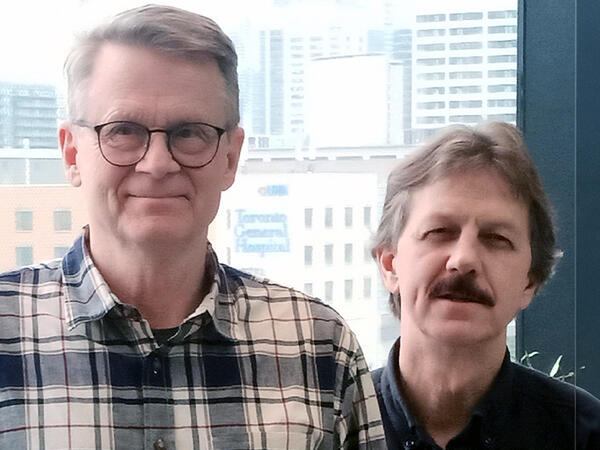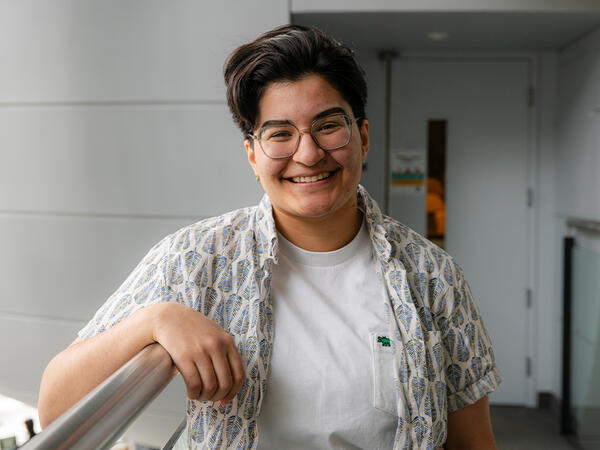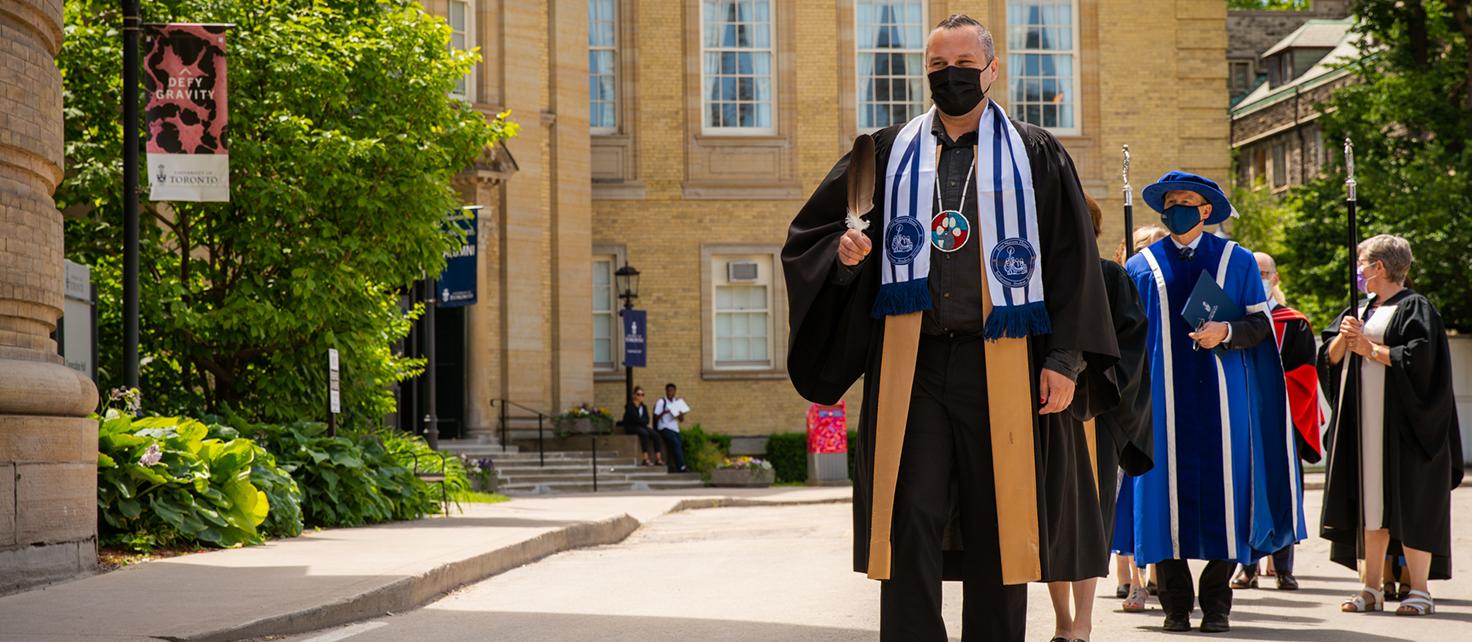Assistant Professor Jaris Swidrovich led the 2022 Leslie Dan Faculty of Pharmacy Convocation procession holding the Eagle Feather, a symbol of the University of Toronto's enduring partnership with Indigenous Peoples.
Jaris Swidrovich leads session during National Indigenous History Month to teach and build knowledge of appropriate terminology
Addressing truth and reconciliation with Inuit, First Nations, and Métis peoples in pharmacy will be a long process with many important steps. But one of the first is basic: using the correct terminology.
“When we’re working with Indigenous communities, using the incorrect terminology or words that might actually hurt Indigenous peoples makes it difficult to move forward,” says Jaris Swidrovich, a Saulteaux First Nations person from Yellow Quill First Nation and assistant professor at the Leslie Dan Faculty of Pharmacy. “I want to be sure that people have the tools of language, so they know what to say or what not to say.”
In early June, Swidrovich led a session organized by the Association of Faculties of Pharmacy of Canada’s (AFPC’s) Truth and Reconciliation Special Interest Group (SIG) focused on best practices for terminology related to Indigenous peoples.
Swidrovich provided examples of words specific to Indigenous cultures that are sometimes used casually in English, such as “powwow,” “spirit animal” and “medicine wheel.” These words refer to significant aspects of Indigenous cultures and should only be used in that context.
He also explained the importance of being conscious and intentional with language, including being careful about how “Canada” is used relative to Indigenous peoples, preferably using the phrase “Indigenous people in Canada” and avoiding referring to Indigenous peoples as Canadians or “belonging to” Canada.
This also applies to using the term Indigenous and understanding what it means. Indigenous is an umbrella term that includes Inuit, First Nations, and Métis peoples and is preferred over “Aboriginal,” which is a legal term in the Constitution and imposed by colonialism. Swidrovich recommends being specific when describing a person’s identity, referring to their nation and whether they are First Nations, Métis or Inuit when possible.
“In order to stand up and stop racist remarks or incorrect terminology, you need to know what’s correct. And you do that by spending time learning, listening, watching, participating in ceremony and showing up for the Indigenous community.”
One practical reason pharmacists should know who is included under Indigenous and the differences between Inuit, First Nations and Métis peoples is to understand who is covered under different benefits programs, particularly the Non-Insured Health Benefits (NIHB) program. And beyond the direct professional applications, knowing what is correct and appropriate to say is an important tool in addressing anti-Indigenous racism.
“In order to stand up and stop racist remarks or incorrect terminology, you need to know what’s correct. And you do that by spending time learning, listening, watching, participating in ceremony and showing up for the Indigenous community,” says Swidrovich. “It’s pretty hard to lift up and support people without knowing much about them.”
He adds that Indigenous Peoples, including himself, have no choice but to speak up when they hear racist or culturally insensitive words and may face resistance for doing so. But true allyship means doing what is right, even when there may be consequences.
“Having an unconditional level of support from colleagues in pharmacy would be ideal, not being afraid of consequence, or speaking up anyway even if you are afraid,” says Swidrovich. “Being part of both truth and reconciliation may sometimes mean having difficult conversations with colleagues, friends or family, but you have to stand up for what’s right. And part of that is learning.”
Professional groups help to include Indigenous perspectives in pharmacy education and create sense of community
Swidrovich’s terminology presentation is one of four sessions taking place this month organized by the AFPC Truth and Reconciliation SIG to recognize National Indigenous History Month.
Swidrovich founded the SIG several years ago, after seeing a great need for more Indigenous health content in pharmacy curriculum and fielding many requests from Faculties of Pharmacy to consult on this content. The group currently has members from all 10 pharmacy schools in Canada and is co-chaired by Swidrovich and Elaine Lillie from the University of Waterloo.
“This SIG has helped fulfill that concept to make sure that Indigenous Peoples’ perspectives are included in pharmacy education.”
“There’s definitely an appetite and desire for this type of content. The concept of ‘Nothing about us without us’ is challenging when Indigenous peoples are vastly underrepresented among pharmacy faculty,” says Swidrovich, who is currently the only self-identified Indigenous pharmacy faculty member in Canada. “This SIG has helped fulfill that concept to make sure that Indigenous Peoples’ perspectives are included in pharmacy education.”
Swidrovich recently founded the Indigenous Pharmacy Professionals of Canada (IPPC), a professional association for Indigenous pharmacists, pharmacy technicians, and pharmacy assistants across Canada. Swidrovich and Amy Lamb, a Métis pharmacist who practises in Saskatchewan, are co-chairs of IPPC. They plan to offer mentorship and support to Indigenous pharmacy professionals as well as education and resources to non-Indigenous pharmacy professionals. Importantly, they will also work to build a greater sense of community among Indigenous Peoples working in pharmacy.
Through his PhD research examining Indigenous Peoples’ experiences with pharmacy education in Canada, Swidrovich came to learn that such a group was urgently needed.
“Many Indigenous pharmacy professionals are working across the country, and they are often the only Indigenous person in their setting and may not know or be aware of others,” says Swidrovich. “This group provides a sense of community and gives us a chance to talk about who we are and where we come from. I really look forward to us continuing on this path.”
Being the first and perhaps only Indigenous pharmacy faculty member in Canada, Swidrovich has taken on the additional responsibilities of educating non-Indigenous people, and consulting on, creating and teaching topics related to Indigenous health. He is happy to do this work and wants to make sure that Indigenous perspectives are included, but it has also required him to change how he sees his professional identity.
“That led to a lot of self-reflection and many conversations with Elders, and the message was the same: folks in the pharmacy profession need to know this content, and I’m able to teach them. But that has meant sacrifices to some of my pharmacist identity and therapeutics knowledge,” says Swidrovich.
Truth and reconciliation in pharmacy needs to take place over the whole life cycle of pharmacy education and practice, from recruitment strategies that make meaningful efforts to reach Indigenous communities to decolonizing and Indigenizing the curriculum and supporting continuing professional development. It is not an easy process, but these efforts are critical to improve health care for Inuit, First Nations and Métis peoples. Swidrovich looks forward to working with colleagues, students, Elders, and Indigenous community members as this work progresses at the Leslie Dan Faculty of Pharmacy.
“It is crucial that our graduates are able to recognize and ultimately help dismantle the structural barriers that exist within our healthcare system that negatively impact access to quality care and health outcomes for Indigenous Peoples,” says Natalie Crown, Director of the Doctor of Pharmacy program, Leslie Dan Faculty of Pharmacy. “This foundational work is important to ensuring our students are equipped with the knowledge and skills required to realize these goals.”
The greatest gaps in health outcomes experienced by people in Canada are between Indigenous Peoples and non-Indigenous peoples, says Swidrovich. “Pharmacy professionals are accessible and trusted health care professionals, so we have considerable opportunity and responsibility in truth and reconciliation.”
More News
Image

Jeffrey Henderson Receives Prestigious Connaught Innovation Award
Award will support research to advance novel method of modifying cells for testing new gene therapies.
Read More
Image

Faces of PharmSci: Mahya Rezaeifarimani
Supervised by Prof. Shirley Wu, PhD student Mahya Rezaeifarimani is developing smart nanoparticles to help make radiation therapy work better for brain tumours by targeting low-oxygen areas that often make treatment less effective.
Read More
Image

Dean Lisa Dolovich reappointed for second term
Professor Lisa Dolovich has been reappointed for a second term as Dean of the Leslie Dan Faculty of Pharmacy, University of Toronto, effective July 1, 2025, to December 30, 2030.
Read More
